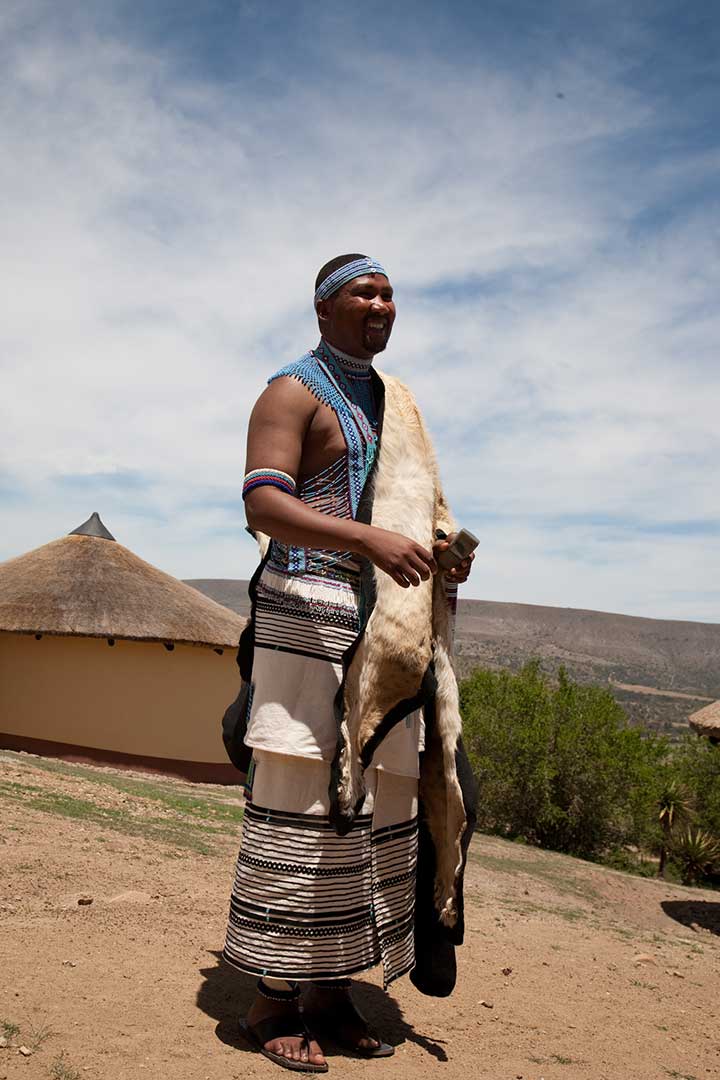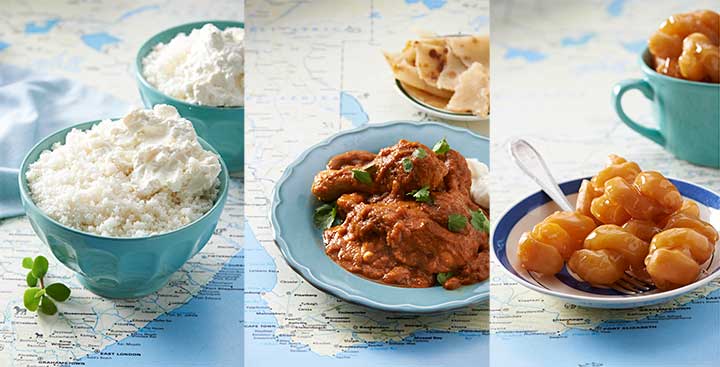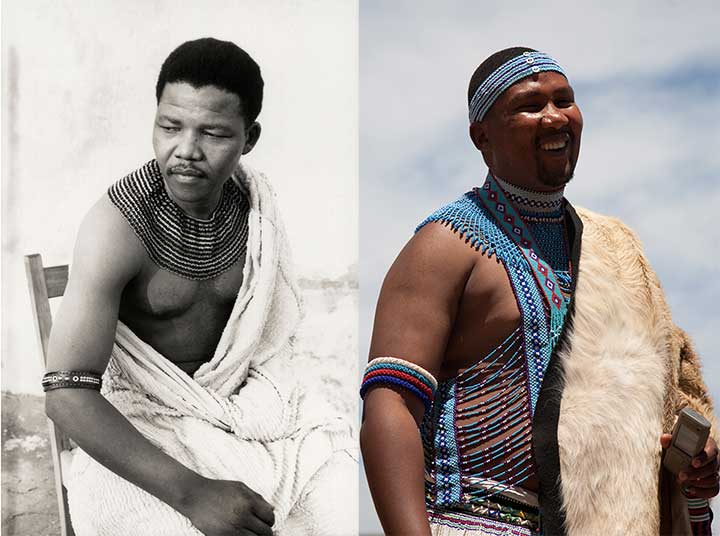Chief Nkosi Zwelivelile Mandlesizwe Dalibhunga Mandela, grandson of the beloved Madiba, shares with Anna Trapido the intense connection he has with his grandfather’s birthplace, Mvezo Komkhulu, as well as the dishes he grew up with…
Recipes supplied by Nkosi Zwelivelile Mandlesizwe Dalibhunga Mandela
Styling by Anna Trapido
Photographs by Anna Trapido, Curtis Gallon and Spaarnestad/Eli Weinberg
Nkosi Zwelivelile Mandlesizwe Dalibhunga Mandela is an intriguing and unusual amalgam of urban and rural. At 43, this Soweto-born, Rhodes University graduate is as comfortable in Gauteng’s hustle and bustle as he is beside an Eastern Cape cattle kraal. Like his late grandfather did with admirable cohesiveness, the chief is attempting to weave ancient tradition into a coherent and inclusive vision for modernity. His is not a rose-tinted spectacle look at country life from the comfort of an urban armchair, but rather a lived daily quest to improve the circumstances of the community who look to him for leadership.
Chief Mandela assumed the hereditary chieftaincy of Mvezo Komkhulu (Madiba’s birthplace) in April 2007. The title is a restoration of a role that had been improperly confiscated from his great-grandfather, Nkosi Mphakanyiswa Gadla Mandela, by colonial authorities in 1926. In May 2009, Nkosi Zwelivelile was deployed by the African National Congress (ANC) and has since served in the National Assembly as a Member of Parliament. He now splits his time between Cape Town and Mvezo Komkhulu.
The chief’s commitment to the rural community of his forefathers is evident when he says: “I feel a great sense of connection with this land. Since the time when my great-grandfather, Nkosi Mphakanyiswa [Madiba’s father] was deposed, Mvezo has been greatly impoverished and development is desperately needed, but there is nowhere more beautiful. When the wind whistles through the mealies or I see the majesty of the Mbashe River, I feel the guiding presence of my ancestors.”

Chief Mandela’s warm but stately personality is striking, like that of his grandfather. So much so, that it is easy to forget imprisonment kept them apart for many years. He says, “For a long time, I wasn’t allowed to see him at all. Then, when I was nine years old, the authorities granted permission. I was taken to meet him at Pollsmoor Prison. We tried to connect through letters, which were often censored by the former Apartheid regime, but it is the little gestures I remember most. One of my fondest memories will always be a pair of soccer boots he sent me as a present for my birthday.”
The chief remembers that “visits to Pollsmoor were facilitated by my grandfather’s lawyer, Dullah Omar, and his lovely wife Farida Omar, who would pick me up at the airport and take me to the prison. After the visit, Farida would spoil me. She could see it was tough for a kid. She cooked superb curries and great biryani. My grandfather had loved curry from the early days of being in Johannesburg, so I think it pleased him that I had inherited that love for curries. Certainly after his release, it was something we shared. He was disappointed that I loved soccer – not boxing – but the curry thing pleased him!”
Later, there were occasional overnight stays, but as the chief observes: “A prison is a prison, no matter how many comforts are added to try and disguise that fact. Looking back as an adult, I can see that my grandfather wanted terribly to guide us and that his inability to be there on a daily basis was extremely painful and worrying for him. In a lot of ways, I think he was not used to children and the ways they behave. I remember once he had been moved to Victor Verster prison, my cousin Nandi and I spent a weekend there. We arrived on the Saturday, stayed the night and left on a Sunday. He saw us jumping into a swimming pool and he said, ‘No, no, that’s not how you get into a pool – you need to slowly take the water and slowly apply it to your skin. So it gets the feeling of cold water’, but we liked the feeling of jumping in. The splash was the excitement. He was really worried by it.”
In 1990 Madiba came out of jail, determined to make up for lost time and his grandson remarks that “perhaps because he had been away from family for so long, he valued togetherness for its own sake. On the rare occasions that my grandfather had free time, he preferred to stay in with family. He wasn’t an occasional-visit kind of grandfather. My brothers and I lived with him permanently since 1993; after his separation from my step-grandmom, Winnie, he moved to Houghton and my three brothers and I went with him. He was very involved in guiding us. I know he stopped me from making some really foolish decisions. I remember, when I was 19, I got it into my head that I would give up my studies and become a DJ. It sounds ridiculous now, but at the time, I was serious. Needless to say, he wasn’t having that!”
During this time, the flavours at the president’s table generally reflected his Eastern Cape origins, because “my grandfather was very passionate about his traditional food. Obviously, once Aunty Graça [Mrs Machel, Madiba’s third wife and widow] came into our lives, seafood became more of a feature because of her Mozambican traditions, but even then it was the foods his mother, Nosekeni Nongaphi Mandela, had raised him on that we ate most often. He favoured dishes like umngqusho [samp and beans], umphokoqo [crumbly mealie pap with amasi] and uluso (tripe cooked as a stew) and his personal chef, Xoliswa Ndoyiya, was really skilled at making such foods. My grandfather was concerned with health and he rightly saw great value in traditional food in this respect. Occasionally, he did make an exception. Especially for koeksisters, which he said he knew were not healthy, but were delicious.”

Much is made in the media of Nkosi Zwelivelile’s multiple marriages, but his respect for women is evident in his observation that “for 30 years it was the strength of the Mandela women who maintained the family – that is the untold fact. My grandfather’s mother, Nosekeni, and her daughters Baliwe and Notancu, and my grandmother, Evelyn Ntoko Mase – they held the family together against great odds. Thanks to them, there was a life for my grandfather to come back to when he came out of jail.” My grandfather guided me, but it was also due to the strength, knowledge and memories of these great women that I became so fond of the place Madiba called home. Home is the base from which all other strength resonates. It gives us all the power to move out into the world and be all we can be…”


